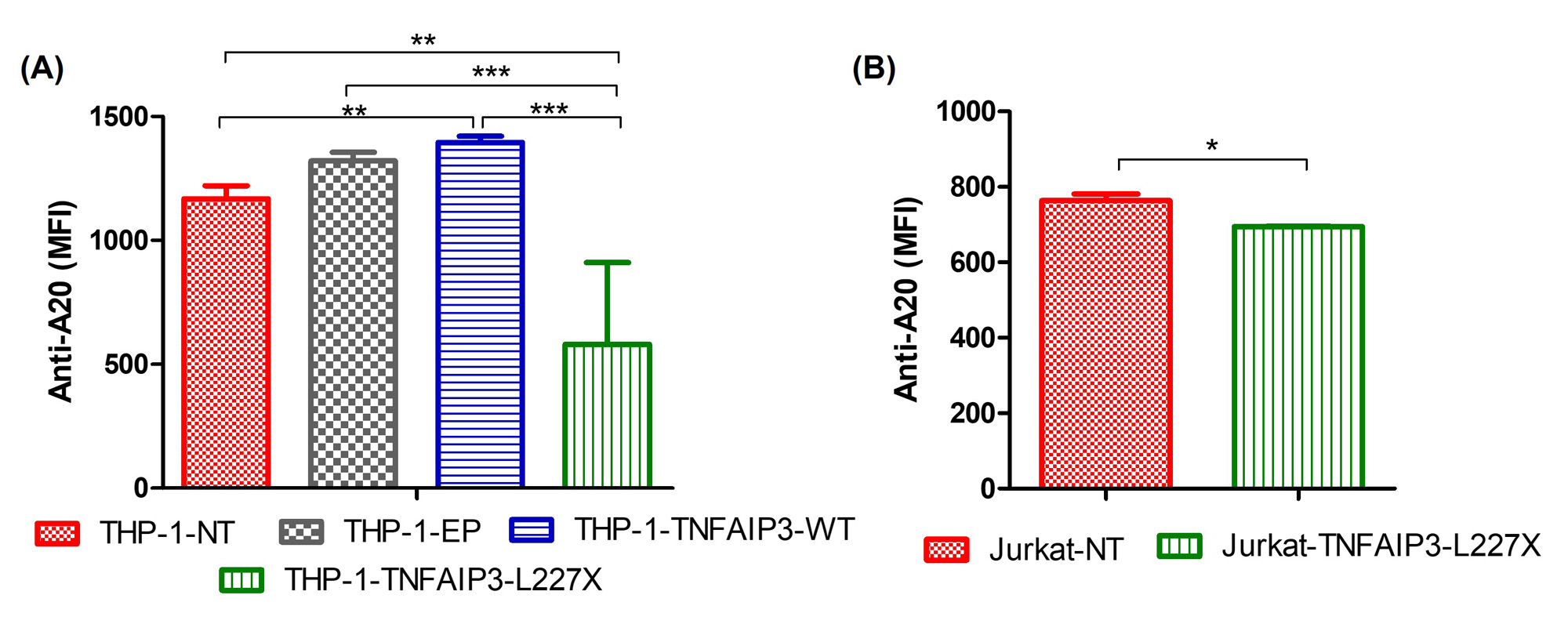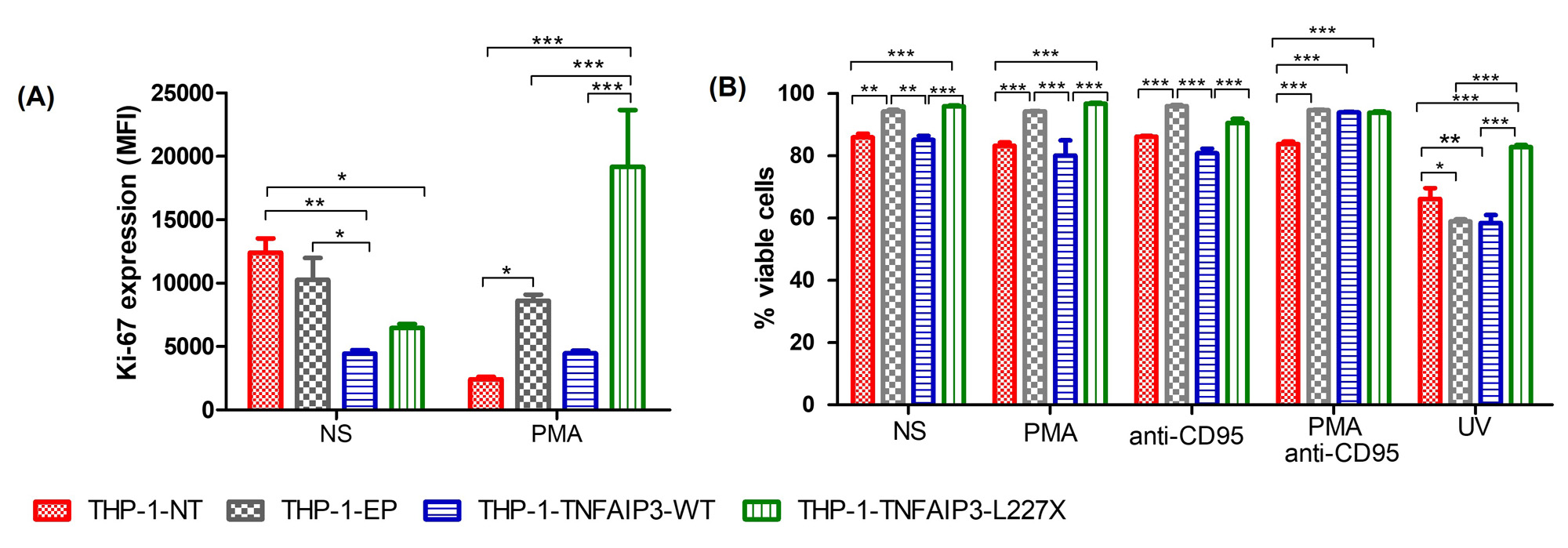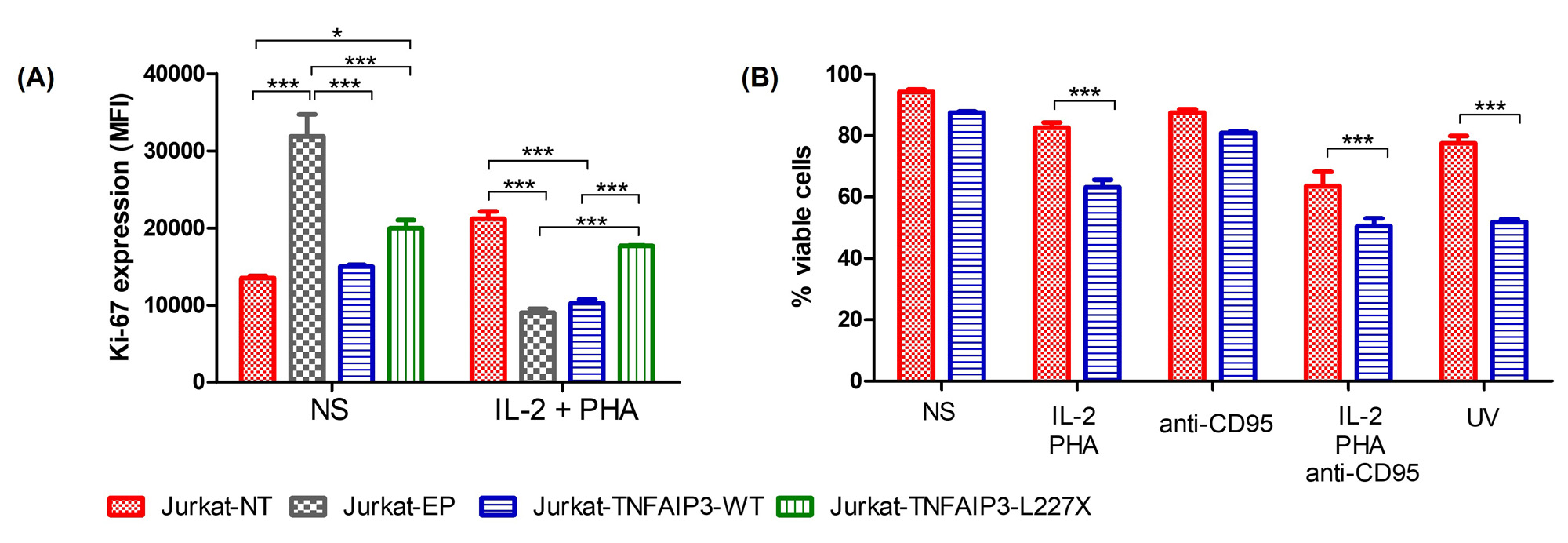Session Information
Date: Sunday, November 12, 2023
Title: (0252–0282) Miscellaneous Rheumatic & Inflammatory Diseases Poster I
Session Type: Poster Session A
Session Time: 9:00AM-11:00AM
Background/Purpose: A20, encoded by TNFAIP3, plays a critical role in NF-κB pathway regulation. A20 haploinsufficiency is a monogenic disorder form of Behçet’s disease with a wide spectrum of phenotypic manifestations. This study aimed to establish an in vitro model to investigate the impact of the TNFAIP3 L227X pathogenic variant on cellular survival and proliferation.
Methods: Jurkat (T cell neoplastic lineage) and THP-1 (monocytic lineage) cells were transfected with a plasmid engineered to express either wild-type (WT) or L227X TNFAIP3. A20 protein expression was assessed, and Ki-67 expression was utilized as a measure of cell proliferation. Cell resistance to apoptosis was evaluated using annexin V and propidium iodide staining (before and after ultraviolet [UV] radiation or anti-CD95 stimulus). Jurkat and THP-1 cells were specifically stimulated with IL-2 + phytohemagglutinin (PHA) and phorbol-miristate-acetate (PMA), respectively. Non-transfected (NT) cells and empty plasmid (EP)-transfected cells served as controls. Flow cytometry was employed for all analyses.
Results: TNFAIP3-L227X transfection reduced A20 protein expression in both THP-1 (MFI=581.0 ± 329.0) and Jurkat cells (763.7 ± 17.32) compared to NT cells (respectively, 1169 ± 51.50 [p < 0.01] and 694.5 ± 0.5 [p < 0.05], figure 1). THP-1-TNFAIP3-L227X exhibited increased Ki-67 expression after PMA stimulus (19180 ± 4473), in contrast to THP-1-NT cells (2435 ± 187.4, p< 0.001, figure 2A). Moreover, THP-1-TNFAIP3-L227X cells displayed significantly higher resistance to apoptosis at baseline and when stimulated with anti-CD95 (with or without PMA) or exposed to UV radiation (figure 2B). Jurkat-TNFAIP3-L227X (19960 ± 1048) showed elevated Ki-67 levels at baseline compared to Jurkat-NT cells (13520 ± 249.5, p< 0.05), but not compared to Jurkat-EP cells (31870 ± 2843, figure 3A), which exhibited a substantial baseline increase in Ki-67 expression. Intriguingly, TNFAIP3-WT transfection produced opposite effects, including lower proliferation rates and reduced resistance to apoptosis in both THP-1 (figure 2B) and Jurkat cells (figure 3B).
Conclusion: TNFAIP3 L227X variant significantly impacts cell survival and proliferation in monocytic and T-lymphoid cell lineages, promoting a predominantly hyperproliferative state. Reduced A20 protein expression in both Jurkat and THP-1 suggests that L227X variant may exert a dominant negative effect on the WT TNFAIP3 gene. Despite the limitations inherent to this cell model, our results suggest the potential utility of these functional assays for diagnosing patients suspected of harboring TNFAIP3 genetic variants.
To cite this abstract in AMA style:
Aires P, Pioto D, TErreri M, Perazzio S. Understanding Monogenic Behçet’s Disease Pathophysiology: Impact of Pathogenic Variant L227X Associated with Autoinflammatory A20 Haploinsufficiency on Cellular Survival and Proliferation [abstract]. Arthritis Rheumatol. 2023; 75 (suppl 9). https://acrabstracts.org/abstract/understanding-monogenic-behcets-disease-pathophysiology-impact-of-pathogenic-variant-l227x-associated-with-autoinflammatory-a20-haploinsufficiency-on-cellular-survival-and-proliferation/. Accessed .« Back to ACR Convergence 2023
ACR Meeting Abstracts - https://acrabstracts.org/abstract/understanding-monogenic-behcets-disease-pathophysiology-impact-of-pathogenic-variant-l227x-associated-with-autoinflammatory-a20-haploinsufficiency-on-cellular-survival-and-proliferation/



